Don Clinchy's blog
Review: Slacker 2011
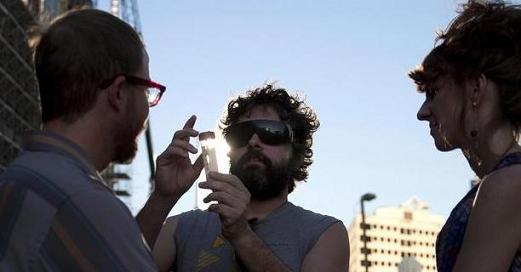
To Austin indie film fans, remaking the iconic Slacker may be the Austin equivalent of remaking Citizen Kane.
Producing a new version of what is arguably the most important and cult-worshiped film in Austin cinematic history is a herculean and potentially thankless task. The danger, of course, is that the end result might be at best a ho-hum imitation of the original film or at worst a widely scorned mess of a movie that pleases no one and embarrasses everyone attached to the project. ("What Were They Thinking?" the Austin Chronicle cover would read.) Like Citizen Kane, Slacker may be best left alone.
I am happy to report, then, that Slacker 2011 is neither a ho-hum imitation of Slacker nor a mess of a movie. It is an entertaining and generally well executed update of and tribute to Richard Linklater's classic. If you like Slacker, you'll probably like Slacker 2011.
Of course, given Austin's deep pool of filmmaking talent, Slacker 2011 may have been destined for success. A co-production of the Austin Film Society and the Alamo Drafthouse, Slacker 2011 was in the capable hands of no less than 24 teams of local directors and film crews, one for each scene in the original movie. The result is essentially two dozen seamlessly connected short films in diverse styles, each an interesting new take on the original scene.
Review: The Debt
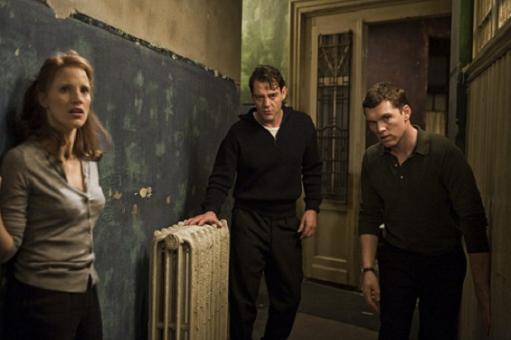
Central to the espionage thriller The Debt (opening in Austin theaters today) is the notion of physical and psychological captivity. In this relentlessly taught, gripping tale, directed by John Madden, the characters are hostages; one is physically bound by the others, but all are prisoners of their own consciences.
The story of three agents of the Israeli intelligence agency Mossad assigned to capture a Nazi war criminal, The Debt opens in 1997, when retired agents Rachel Singer (Helen Mirren) and Stephan Gold (Tom Wilkinson) are dealing with tragic news about their former colleague, David Peretz (Ciarán Hinds). Peretz's fate unearths an ugly history of lies and subterfuge involving all three agents, forcing Singer and Gold to confront their pasts.
For decades, the nation of Israel has venerated Singer, Gold and Peretz for a mission they undertook in 1965, when they tracked down Nazi war criminal Dieter Vogel (Jesper Christensen). Known as the Surgeon of Birkenau, Vogel's ghastly medical "experiments" left thousands of concentration camp victims disfigured or dead. By the 1960s, Vogel had successfully hidden his past, working under an assumed name as a physician in East Berlin. He evaded justice until Singer, Gold and Peretz finally captured him in a complex operation involving false identities, kidnapping and great personal risk.
Review: The Guard
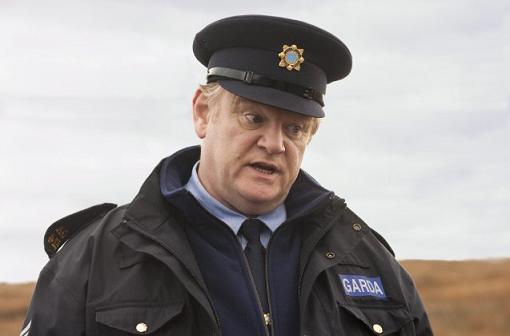
The Irish buddy-cop comedy The Guard, opening Friday at Arbor and Violet Crown, is an interesting study in contrasts between typical American crime films and their European counterparts. Slow paced, quiet and character driven, The Guard has all the hallmarks of box-office disaster for any American movie about cops and their adversaries. There is little action or gunfire until the climax and a scant splatter or two of blood.
What The Guard does have -- which may not be enough to hold the interest of domestic audiences -- is plenty of wit and sparkling chemistry between its stars.
Set in Ireland's rural west -- a rugged, misty landscape where the first language for many is Gaelic -- The Guard explores the unlikely alliance between Irish Sergeant Gerry Boyle (Brendan Gleeson) and American FBI agent Wendell Everett (Don Cheadle), who team up to investigate an international drug smuggling ring linked to the disappearance of one of Boyle's fellow officers. The pair are a classic (actually, completely clichéd) cop movie odd couple, a brash, subversive rule-breaking small-town cop with a fondness for prostitutes paired with a low-key, straight-laced FBI agent.
Review: Bellflower
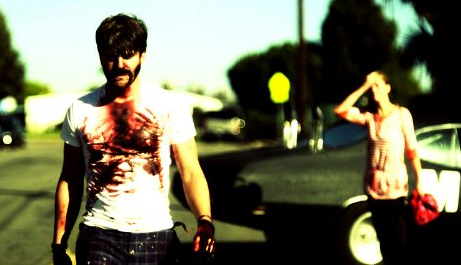
While twentysomething angst is a common theme in indie films, the gritty and violent Bellflower is a unique take on the trials of young adulthood. A flawed but intriguing movie about the post-apocalyptic fantasies of disaffected young men, Bellflower is strong on concept, vision and visuals, if less so in its story and acting.
Writer/director Evan Glodell stars as Woodrow, an aimless Southern California twentysomething who spends his copious amounts of free time fantasizing about vague notions of global destruction. He and his equally aimless buddy Aiden (Tyler Dawson) build a crude but effective arsenal of flamethrowers and other weapons, hoping that post-apocalyptic chaos will allow their would-be gang, Mother Medusa, to rule the day in a spree of incendiary violence.
Waiting for worldwide mayhem, of course, means a lot of waiting. In the meantime, Woodrow meets and falls hard for free-spirited Milly (Jessie Wiseman); in one of many unlikely Bellflower elements, their first date consists of a drunken road trip to Texas in a customized Volvo with a liquor tap on the dashboard. The couple's ensuing relationship is predictably rocky, causing emotional mayhem far more devastating than any of Woodrow's destructive fantasies.
TAMI Flashback: The University of Texas Tower Shootings
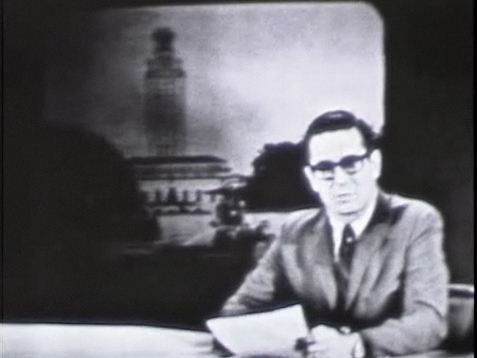
This article is the ninth in a Slackerwood series about the Texas Archive of the Moving Image (TAMI) video library.
August 1, 1966 may be the worst day in Austin history. On that day, 25-year-old University of Texas student Charles Whitman went on a shooting rampage from atop the university tower, killing three people inside the tower and 10 more on the ground below, and wounding 32 others. In the early morning hours before the shooting spree, Whitman also stabbed his mother and wife to death.
The horror of that day lives on in many Austinites' memories. Thanks to reporters and cameramen at Austin's KTBC-TV who covered the story at great personal risk, the horror also lives on in dramatic news footage of the tragedy.
The TAMI library includes several videos about Whitman's rampage. The best of them is Neal Spelce Collection, No. 1 - UT Tower Shooting, a 25-minute broadcast that aired on KTBC on the day of the killings. The video is a startling record of the day's events and a fascinating study in early television journalism.
Lights. Camera. Help. Combines Filmmaking and Activism

Many film fans in Austin care as much about activism as they do about movies. If you're passionate about both, you won't want to miss the Lights. Camera. Help. Film Festival.
The third annual installment of the festival, happening July 28-30, gives non-profit and cause-driven films well deserved attention by screening them in a theater setting. The festival is a non-profit event; all films are submitted for free, and all ticket sale proceeds go directly to the organizations that produce the winning films.
Lights. Camera. Help., the first festival of its kind, is the brainchild of Austinites David J. Neff, Aaron Bramley and Rich Vasquez.
Review: Winnie the Pooh
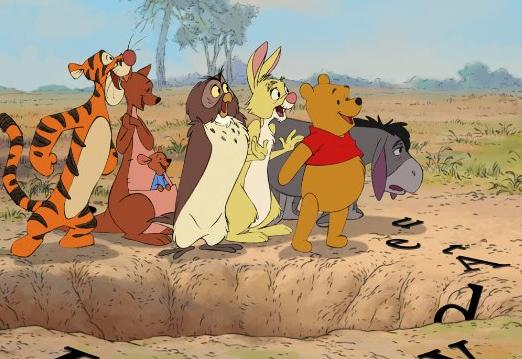
"Oh, bother," said Pooh, "I hope my new film isn't just a cynical attempt to cash in on my beloved reputation."
Silly old bear -- you needn't have worried, for your latest adventure does you great justice. Winnie the Pooh is gentle and charming and funny and warm-fuzzily retro, a 2D (yea!), old school, hand-drawn Disney throwback that celebrates everything we've loved about Pooh and his friends for more than 80 years.
A melding of several familiar Pooh stories, Winnie the Pooh follows its titular character and his Hundred Acre Wood cohorts on a day that goes typically awry. Pooh (voiced by Jim Cummings, who's voiced the bear since the 1980s) awakens one morning to find he's out of honey (familiar story number one). While searching for a meal, he finds Eeyore (Bud Luckey), who's lost his tail (familiar story number two). Pooh's friends organize a contest to find Eeyore a suitable new tail, with the winner awarded a pot of honey. (Sadly, Pooh's attempt to replace Eeyore's tail with a cuckoo clock isn't terribly successful; a half-dozen other items are equally silly and no more suitable.)
Review: Queen to Play
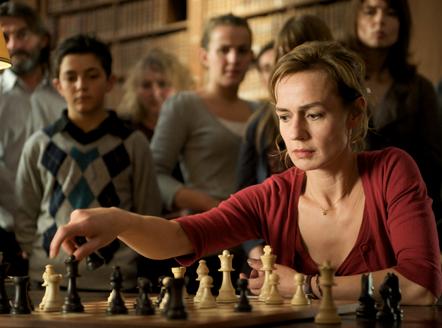
Like the thoughtful, strategy-driven game of chess that is its focus, Queen to Play (Joueuse) is not for the impatient.
A study in parallels between chess and the larger game of life, this quiet French film is many things -- sophisticated, insightful, mildly funny and generally pleasant. One thing it may not be: captivating enough to hold most viewers' interest.
Which is not to say Queen to Play is a bad movie; to the contrary, it has many hallmarks of intelligent, competent filmmaking, with a believable story, great and sometimes surprising character development, and fine acting. And its pacing arguably is appropriate for its subject matter. But depending on your tolerance for slow-paced films -- and mine is quite high -- these attributes may or may not save Queen to Play from being rather dull. I'm still undecided.
Set on the picturesque island of Corsica, Queen to Play is the story of Hélène (Sandrine Bonnaire), a middle-aged chambermaid whose boring job and marital frustration leave her longing for a more meaningful, happier life. She develops a new interest in chess (actually, it's more of an obsession); to improve her skills, she asks for help from one of her employers, grumpy American expat Kröger (Kevin Kline).
Review: Beginners
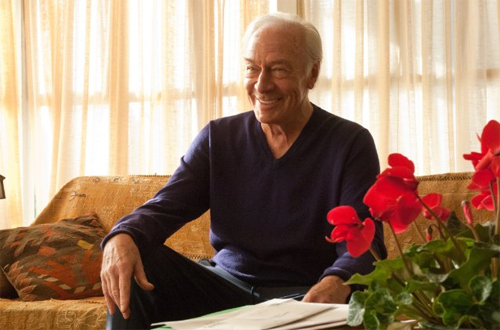
According to the laws of coherent filmmaking, Beginners shouldn't work at all. The movie combines disparate elements unlikely to work together -- two love stories, a coming-out comedy, a withering statement about bigotry, a tragic death, a commentary about art versus commerce and even an oh-so-cute dog. And while juggling all these moving parts, the story constantly jumps from now to then and here to there and back again, taking us from modern-day Los Angeles to 1930s Germany to a half-dozen worlds in between.
But Beginners works well, smashingly well, so well that it's among my favorite films of this year. Much of the credit goes to Christopher Plummer, who blesses Beginners with one of the finest performances of his career.
Beginners is told from the point of view of Oliver (Ewan McGregor), a young artist whose father, Hal (Plummer), has recently died of cancer. When Oliver's mother,Georgia (Mary Page Keller) died a few years earlier, Hal announced he was gay, having been not quite totally closeted through more than 40 years of marriage. In funny and sympathetic flashbacks, we see that Hal's coming out was both awkward and profoundly liberating. Freed from the bonds of a pointless marriage and in a new relationship with a much younger man, Andy (Goran Visnjic), Hal never was happier.
Review: Buck
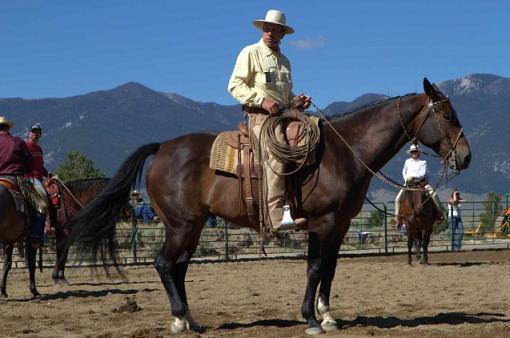
"A lot of times, rather than helping people with horse problems," says Buck Brannaman, "I'm helping horses with people problems."
The subject of the documentary Buck, horse trainer Brannaman travels America teaching horse owners positive ways to communicate with their animals. He is the gentlest of gentle souls, a skilled cowboy whose believes the best way to train a horse is through leadership and sensitivity, not brutality and punishment. Buck is as gentle as its subject, a finely made, ever thoughtful film that shows us how Brannaman's approach applies not only to horses, but to people as well. The movie opens Friday in Austin.
Brannaman's skill with horses is amazing. As he transforms a frightened, unruly horse into a calm, obedient one in a matter of minutes, it's as if he has unique insight into the equine mind. But Brannaman would be the first to say that while he has many well honed skills, he has no special relationship with horses. He merely understands that the best way to work with a horse -- or a human -- is to instill trust, not fear.

